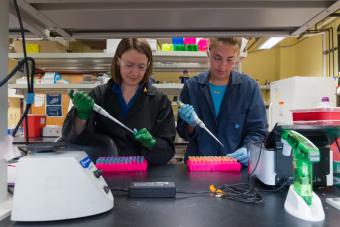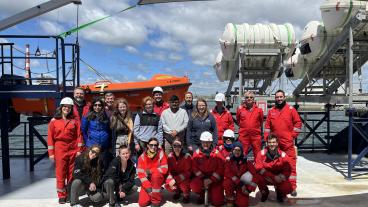Mines researcher receives $1.7M NIH grant to improve understanding of Type 1 diabetes
Dr. Nikki Farnsworth uses biomaterials to mimic the environment of the pancreas, study insulin secretion from islet cells

In the U.S. alone, an estimated 2 million people have Type 1 diabetes, an autoimmune disease that destroys the cells responsible for producing insulin, a hormone necessary for keeping your blood glucose levels in a healthy range.
Patients can be diagnosed at any age and develop symptoms at very different rates, but researchers still don’t understand why the disease looks so different from person to person and the underlying biological mechanisms driving the variation.
“The therapies and understanding of the disease are really limited – it’s a field that’s easily 20 years behind the field of cancer in our understanding of the disease and options for personalized treatments,” said Nikki Farnsworth, assistant professor of chemical and biological engineering at Colorado School of Mines. “Right now, everyone gets the same treatment – injecting themselves with insulin – but there’s a lot of heterogeneity of the disease that we don’t understand. This makes it difficult to develop new therapies to better treat or prevent Type 1 diabetes.”
Farnsworth and her research team at Mines hope to change that, thanks to a five-year $1.7M grant from the National Institutes of Health’s Division of Diabetes and Digestive and Kidney Diseases. The highly competitive NIH independent investigator award will allow Dr. Farnsworth to focus on one potential piece of the Type 1 puzzle – the role of the pancreas microenvironment in regulating insulin secretion from pancreatic islets in both health and in Type 1 diabetes.
“During the progression of Type 1 diabetes, there’s significant changes to the pancreas microenvironment. We know these changes happen, but we don’t know how they contribute to the progression of the disease,” Farnsworth said. “Knowing that could help us to identify new targets for therapies to prevent or delay disease altogether for people who are at risk.”
In her lab, Dr. Farnsworth uses biomaterials to mimic the environment of the pancreas. Researchers in the Farnsworth Lab create synthetic hydrogel scaffolds with extracellular matrix proteins that match the matrix of the pancreas and encapsulate isolated pancreatic islets from both mouse and human sources to replicate the islet environment outside of the body to study how the matrix proteins contribute to islet function.
Dr. Farnsworth also has a partnership with researchers at the University of Colorado Anschutz Medical Campus, where she holds a position as Adjoint Assistant Professor, where promising findings from her basic science research can be translated to preclinical models of Type 1 diabetes.
“The most exciting part of this project is it’s challenging some of the ways the field views the disease,” she said. “We’ve known for decades that it is an autoimmune disease, and the focus has been on immune cells. But now the field has evolved and we think there is a role for these insulin-producing islet beta cells in the progression of the disease.”
Better understanding the pancreatic islet microenvironment could one day mean being able to treat patients before they end up in the hospital in crisis, Farnsworth said.
“Most patients who get diagnosed with Type 1 diabetes end up getting diagnosed after a major health event in the hospital,” she said. “Not understanding they were predisposed to the disease – that’s terrifying as a mom of two young kids. This is a huge push for the field – we could be doing better for these patients and the families of these patients.”




